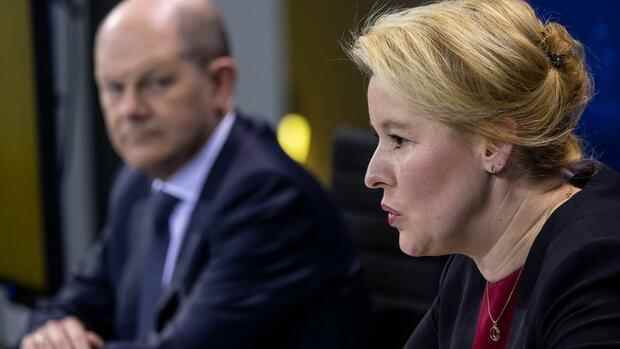The Infection Protection Act provides for extensive easing.
(Photo: Getty Images)
Berlin In an unprecedented federal-state switch, the prime ministers opposed the traffic light government’s latest corona policy across all parties. “Today, two years of common ground are coming to an end,” said Bavarian Prime Minister Markus Söder (CSU), according to participants at the meeting, which Chancellor Olaf Scholz (SPD) also attended.
The reason is the new Infection Protection Act, which the Bundestag wants to pass on Friday. Despite the record number of infections, it provides for extensive easing, such as an end to the mask requirement in many areas of everyday life.
The countries consider the hotspot rule, which is intended to allow stricter measures, to be difficult to implement. The Robert Koch Institute (RKI) reported almost 300,000 new infections within 24 hours on Thursday – more than ever before.
Baden-Württemberg’s Prime Minister Winfried Kretschmann (Greens) said during the switching conference that there had “never been” such a way of dealing with the states. So far we have worked well together for two years. There are “no rational reasons” for this break.
Top jobs of the day
Find the best jobs now and
be notified by email.
Thuringia’s Prime Minister Bodo Ramelow (left) made a similar statement, his Hessian colleague Volker Bouffier (CDU) said: “There was no cooperation with the states.”
>> Read also: Home office, mask requirement, 3G: which measures apply after March 20th – and which do not
Criticism also rained down from the SPD states: “I don’t think that’s justifiable,” participants quoted Lower Saxony’s head of state Stephan Weil as saying. He now expects the federal government to take responsibility. “The pandemic is not over. This is not a good path that is being taken here.”
Chancellor Scholz spoke of a “constructive” discussion after the summit. “Clearly, the countries want more.” However, he also defended the new Infection Protection Act. This does justice to the fact that there are high numbers of infections, but also a milder course of the disease.
In addition to the corona situation, the agenda of the federal-state summit also included the Ukraine war and the drastically increased energy prices. The authorities reported 175,000 registered war refugees from Ukraine. The true number is likely to be significantly higher, since the refugees do not have to register.
“We agree that we protect people who flee to us,” said Scholz on Thursday. There will be many, said the Chancellor. The numbers are already “very high”. The recording will be a “great challenge”. For the necessary help, the federal and state governments would “bundle all the necessary forces”.
Refugee registration required
This also applies to financial issues, which are to be discussed in a federal and state working group and will be decided at the next federal-state meeting at the beginning of April. Scholz also praised the “overwhelming culture of helpfulness” in Germany.
The federal states still see room for improvement in the registration of refugees. It is “essential to register those arriving quickly and easily,” says the summit resolution. “The federal and state governments are in a community of responsibility with the municipalities.”
According to the draft resolution, those who remain in Germany should be registered in the Central Register of Foreigners. Current overloads in individual countries should be avoided. For this purpose, the refugees will be distributed according to the Königstein key. The calculation is based on population and tax revenue.
Because of his corona infection, the Prime Minister of North Rhine-Westphalia was connected via video.
(Photo: Getty Images)
North Rhine-Westphalia’s Prime Minister Hendrik Wüst (CDU) added that refugees had to be prevented from having to sleep in gyms. “Wherever possible, we have to create accommodation in normal apartments.” Wüst and Berlin’s Governing Mayor Franziska Giffey (SPD) also emphasized differences to the 2015 refugee crisis.
Today, women and children in particular come, said Wüst. It must therefore be ensured quickly that people are housed in apartments and “children can be children again”.
Giffey said the lessons of 2015 have been learned. There are “good prerequisites that we can do better this time”. Many of the helpers were already there to take care of the people. Wüst and Giffey both stressed that federal support was essential, including financially.
The federal states are also pushing for state support for German companies that are threatened with bankruptcy due to the sanctions against Russia. According to the resolution paper, the federal government should particularly support those companies that are facing substantial problems due to strong economic ties with the Russian and Ukrainian markets.
Specifically, according to the paper, “support services” should be examined for companies that are affected by supply bottlenecks and the resulting loss of work or increased raw material or energy prices. “This applies above all to the energy-intensive industry and to companies that have been deprived of the basis for their business with the sanctions.”
With agency material.
More: This is how Germany is preparing for the Ukraine refugees
